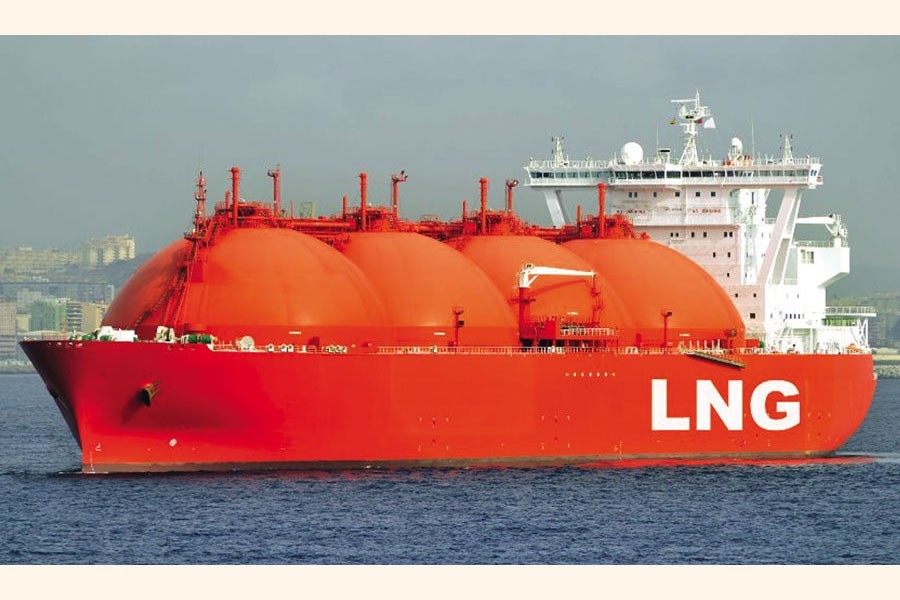The government decides not to import costlier LNG from spot market anymore in a change of heart after importing over a dozen cargoes until August, as open-market gas pricing is getting volatile.
Alleged default on part of some global suppliers of LNG from spot market to several countries and subsequent energy crisis might also be a key mover behind switchover, a senior Petrobangla official told the FE Thursday.
Sources said UAE's Emirates National Oil Company (ENOC) recently defaulted on its deal to supply an LNG (liquefied natural gas) cargo from spot market to Pakistan, aggravating natural gas crisis there.
Switzerland's AOT Trading AG bagged the last cargo deal on spot LNG supply to Bangladesh for August consignment at US$13.069 per million British thermal unit (MMBTU), which is around 50 percent higher than the LNG prices under term deal. Worth of a term deal is currently hovering around US$8.5-US$9.0 per MMBTU.
And the wide price differentials make the authorities wise after the event, and Bangladesh now opts to revert to the mode of binding supply deals for longer terms.
Riding on the government decision to cease LNG import from spot market around a dozen global suppliers are now lobbying with the government to bag long-term LNG-supply deals, said sources.
Rights groups and energy experts, however, suggest ensuring transparency and accountability in selecting new suppliers of expensive LNG as the government has moved to pick several long-term LNG suppliers to meet a mounting natural-gas demand the country is dealing with.
The government should select long-term LNG suppliers following an open and competitive mechanism, energy adviser of the Consumers Association of Bangladesh (CAB) Prof M Shamsul Alam said.
"If the government selects the suppliers arbitrarily, the purchase price of expensive LNG will be costlier," says the campaigner for protection of consumer rights.
The government should avoid the path of selecting long-term suppliers through unsolicited mechanism for the sake of ensuring its 'anti-corruption' image, says energy-expert Prof M Tamim.
He suggests that the government should select the suppliers either through competitive open tender or through 'Swiss Challenge' mechanism.
Swiss Challenge is a form of public procurement operated in some jurisdictions, which requires a public authority that has received an unsolicited bid for a public project or for services to be provided to government, to publish the bid and invite third parties to match or better it.
"Otherwise, the selection process will indicate the involvement of corruption," said Mr Tamim, who was special assistant to the Chief Adviser of a former caretaker government.
If the government fails to ensure competitiveness in public purchases, the formation of Bangladesh Competition Commission (BCC) and spending money on its manpower will be useless, the CAB leader further said.
Role of the Bangladesh Energy Regulatory Commission (BERC) will remain elusive if it fails to ensure competitive energy prices for the consumers, said Mr Alam.
The CAB adviser also demanded immediate cancellation of the Speedy Supply of Power and Energy (Special Provision) Act 2010, which was enacted more than a decade back, to ensure transparency and accountability in the country's power and energy sector.
Government subsidy on energy sector will also mount further as a consequence, they forewarned.
Currently, the country imports LNG under long-term deals from two state-run global suppliers -- Qatar's Qatargas and Oman's Oman Trading International (OTI).
Petrobangla inked LNG sales and purchase agreements (SPAs) with them following G2G negotiations. It started regular import of LNG on September 9, 2018.
State-run Rupantarita Prakritik Gas Company Ltd (RPGCL) had been floating tenders since August 2020 to purchase LNG from spot market under the then government plan to meet around one-fourth of the country's total LNG requirements.
And the state-run Petrobangla started importing LNG from spot market in September 2020.
The latter has been importing a total 64 LNG cargoes in 2021 from term suppliers, two cargoes, or 3.0 percent shorter, from the previous year.
As per the plan, the state entity will import 40 cargoes from Qatargas and 24 from OTI in 2021. It imported 43 cargoes from Qatargas in 2019 and 40 in 2020, while 20 cargoes from OTI in 2019 and 26 in 2020.
It had plans to import 18 LNG cargoes from spot market in 2021 against only one cargo in 2020, said officials.


